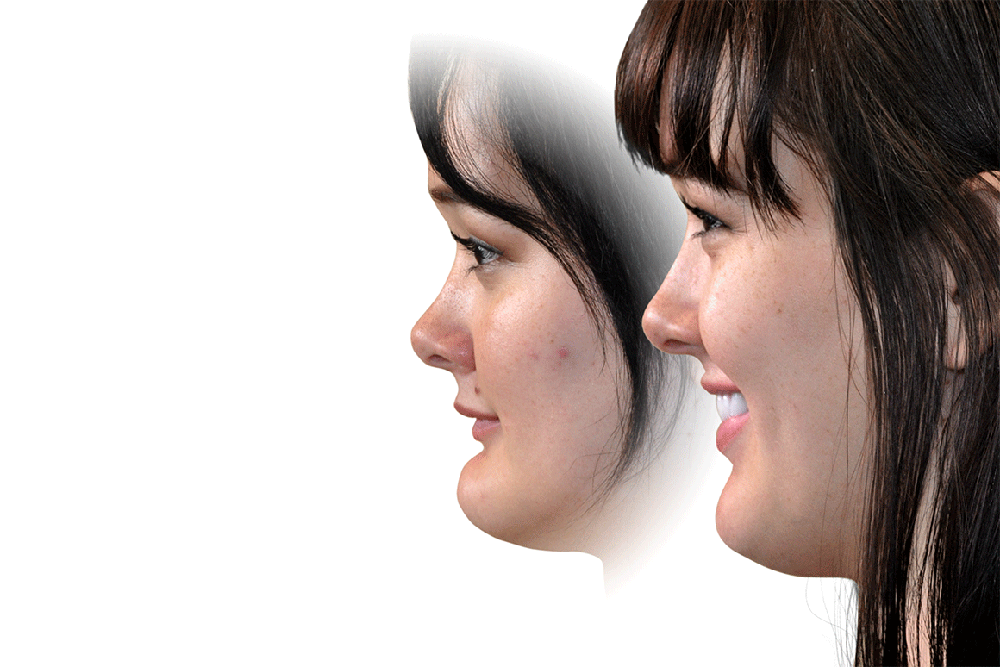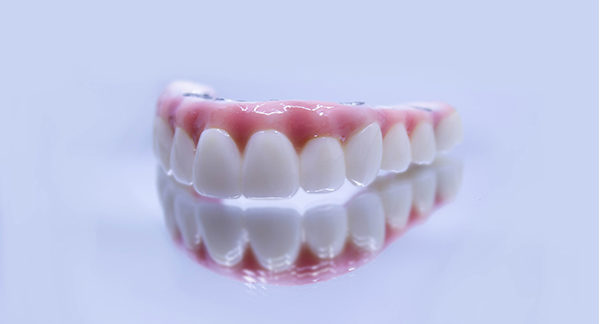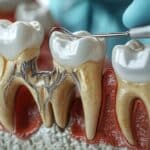1. What Do Implants Taste Like?
Titanium implants are non-corrosive and do not leave behind any metallic taste. The bridges, or the prosthetic teeth fixed to your implants, are malodorous, meaning they are tasteless. After New Teeth Now, you can fully enjoy the flavor of your food without the lingering aftertaste of infection left by decaying or unhealthy teeth. Our patients often share with us how having the procedure done greatly improves their enjoyment of food.
2. Can You Feel Zygomatic Implants in Your Cheeks?
The region of the cheekbone that supports a zygomatic implant does not have nerve receptors, meaning you won’t feel the implants when they’re in place. Placed by a qualified oral and maxillofacial surgeon, zygomatic implants will not cause any pain. The placing of zygomatic implants is much less complicated for the patient than alternatives that require more surgeries and more visits.
You also won’t feel the implants with your fingers. They are anchored within the tissue of the jaw and the cheekbones. There is no protrusion changing the shape or texture of the face.
3. Can You Go Through a Metal Detector with Dental Implants?
Titanium implants are not magnetic. This means they won’t set off a metal detector. This means you can safely travel through security checks at the airport without sounding off an alarm because of dental work at New Teeth Now.

4. Is It Hard to Floss with Full Mouth Dental Implants?
The difficulty of flossing depends on how the teeth are made. New Teeth Now prosthetics are milled at our dedicated lab in Lakeland, FL. Because each bridge is one sleek and solid unit, there is no need for traditional flossing. New Teeth Now patients use a water flosser to wash away buildup that can collect between the bridge and the gums.
5. Can Dental Implants Cause Tinnitus?
Tinnitus, or the ringing in the ears, is not caused by dental implants or prosthetics. However, any loud or strong vibration near enough to the ears can cause trauma to the cochlear nerve. Since the mouth is close to that part of the body, any dental work that requires instruments can agitate the sensitive anatomy of the ear.

6. Do Implants Change a Person’s Sense of Smell or Taste?
Many patients come to New Teeth Now to cure their periodontal disease once and for all. They often report being better able to taste and smell after the procedure because of the removal of bacteria following their extractions. This is also another benefit of New Teeth Now over dentures, as most dentures and partials will cover a portion of the palate, greatly reducing a person’s sense of taste.
7. Do Implants Increase a Person’s Chance of Developing Sinusitis or Sinus Infections?
This is an infrequent question in our office. Some patients are concerned that zygomatic implants or maxillary (upper jaw) implants pose a risk of sinus complications. However, when our oral surgeons place the upper implants, they do not breach the sinuses. In short, implants will not cause any new issues with a patient’s sinuses.
8. Can Zygomatic Implants Affect Vision?
No. While the zygomatic bone (cheekbone) is near sensitive nerves in the eye, zygomatic implants will not affect this area.
In recent years, it has become more common to see general dentists advertise zygomatic implants. Please be aware that this procedure is very sensitive and specialized, and it should only be performed by a qualified oral surgeon. We strongly advise against having zygomatic implants placed by your general dentist. For your safety and to avoid unnecessary complications, zygomatic implants should only be placed by a qualified oral surgeon.
9. Do Implants Change the Shape of Your Face?
Full mouth implants can improve your bite alignment, which can significantly change the shape of the face. You can see how radical this transformation can be in our before-and-after gallery. Single dental implants can also have an impact on your bite, though it’s less likely to make a dramatic difference in a patient’s appearance.
For patients transitioning from a denture to full mouth implants, or any patient with severe bone loss, the New Teeth now procedure can improve the volume and contours of the face. Many of our patients have been excited by this

10. Can I Get Implants If I Have Osteoporosis?
Maybe. This depends on your prescription history. If you have questions about your medical history, give us a call. We can help you determine if you qualify for this type of procedure.
11. Can I Scuba Dive with Dental Implants?
Yes. Titanium implants are a lightweight, solid metal. They are extraordinarily resistant to pressure changes.
12. Can Professional Athletes in Contact Sports Get Dental Implants?
They can. If you are experiencing regular tooth loss or your sports activities are the direct cause of having dental implants fail (from blunt trauma, for example), then that would be a separate concern. You can’t get a new dental implant at the same site every few months. But as a general rule, a fully healed and integrated dental implant is a safe option for contact sports. Take care to protect your dental health by using the recommended gear.
13. Can You Go to Outer Space If You Have Dental Implants?
Yes. If you have an opportunity to go to outer space, your dental implants won’t stop you.
14. Are Dental Implants Sensitive to Hot or Cold Food and Drink?
There is no increased sensitivity to hot or cold food and drink caused by dental prosthetics. The prosthetic has no nerve connectivity, and the thermal conductivity of zirconia is very low, meaning changing temperature does not travel quickly through the material.
15. Can You Feel Implants When Riding a Roller Coaster?
Can you feel your natural teeth when you are riding a roller coaster? The same rules apply. Dental implants will heal and fuse with the bone in a process called osseointegration. A healthy implant won’t wiggle around or rattle any more easily than a healthy tooth would.
16. Do Dental Implants Have Fake Gums on Them?
Some do. At New Teeth Now, the upper and lower bridge fixed to your implants will include prosthetic gum. This gives your final teeth a much more comfortable feel and a more realistic look, as the gums are specially crafted to fit above the unique anatomy of your gum ridge. Not to worry. No one can tell they aren’t your natural gums.

17. Do You Ever Need a Root Canal If You Have Full Mouth Dental Implants?
No. You no longer have natural teeth. A root canal procedure is intended to preserve the function of natural teeth.
18. Can Dental Implants Change the Sound of My Singing Voice?
This is possible. To have anything new permanently placed in your mouth can cause you to sound differently than you did before. New Teeth Now is much sleeker and less obstructive than other options such as dentures. However, it is non-removable.
In the embedded video below, Dr. Kirkpatrick answers in greater detail the question, “How common are speech difficulties after full mouth dental implants?”
19. What Is the Cut-off Age for New Teeth Now?
You must be 18 years or older to qualify for the New Teeth Now procedure. Over the years, we have seen a mix of adult patients of all ages and backgrounds. Young adults in their mid-twenties and early thirties will often first connect with us on social media to find out if New Teeth Now is right for them. It’s also not that uncommon for an octogenarian or an even older patient to qualify for New Teeth Now, because, like anyone else, they deserve to better enjoy their favorite foods.









